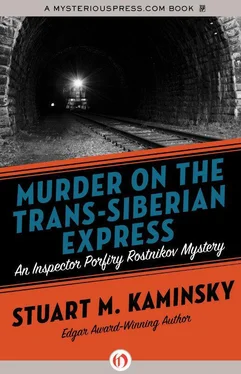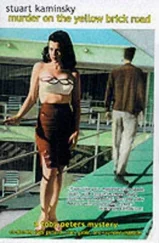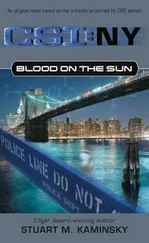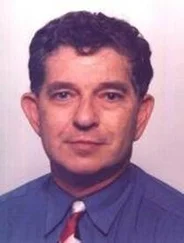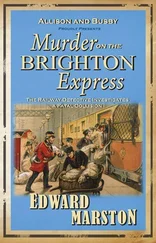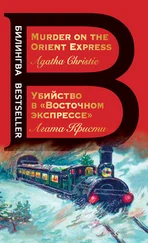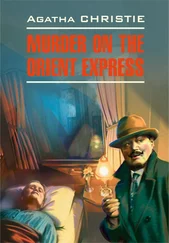Stuart Kaminsky - Murder on the Trans-Siberian Express
Здесь есть возможность читать онлайн «Stuart Kaminsky - Murder on the Trans-Siberian Express» весь текст электронной книги совершенно бесплатно (целиком полную версию без сокращений). В некоторых случаях можно слушать аудио, скачать через торрент в формате fb2 и присутствует краткое содержание. Год выпуска: 2012, Жанр: Полицейский детектив, на английском языке. Описание произведения, (предисловие) а так же отзывы посетителей доступны на портале библиотеки ЛибКат.
- Название:Murder on the Trans-Siberian Express
- Автор:
- Жанр:
- Год:2012
- ISBN:нет данных
- Рейтинг книги:3 / 5. Голосов: 1
-
Избранное:Добавить в избранное
- Отзывы:
-
Ваша оценка:
- 60
- 1
- 2
- 3
- 4
- 5
Murder on the Trans-Siberian Express: краткое содержание, описание и аннотация
Предлагаем к чтению аннотацию, описание, краткое содержание или предисловие (зависит от того, что написал сам автор книги «Murder on the Trans-Siberian Express»). Если вы не нашли необходимую информацию о книге — напишите в комментариях, мы постараемся отыскать её.
Murder on the Trans-Siberian Express — читать онлайн бесплатно полную книгу (весь текст) целиком
Ниже представлен текст книги, разбитый по страницам. Система сохранения места последней прочитанной страницы, позволяет с удобством читать онлайн бесплатно книгу «Murder on the Trans-Siberian Express», без необходимости каждый раз заново искать на чём Вы остановились. Поставьте закладку, и сможете в любой момент перейти на страницу, на которой закончили чтение.
Интервал:
Закладка:
Not for the first or thousandth time, Rostnikov thanked whatever gods might be (or common genetic chance) that their son had turned out to look like his mother. Porfiry Petrovich was not ugly, but he knew that he possessed the flat, homely face common to millions of Russians descended from dozens of generations of peasants. He was comfortable with his face, the face of his own father, and his body, the compact solid body that had earned him the nickname of “the Washtub.”
“The cake is good,” said Laura, who bore a resemblance to her mother even more striking than Iosef’s to Sarah.
“Your grandmother is the giver of all cakes and cookies,” he said. “Look at me. I have grown fat with the sweets she brings home from the bakery.”
“You are not fat,” Nina said, touching his stomach. “You are round and strong and have a plastic leg.”
“Thank you,” said Rostnikov.
There were five chairs at the table. Three matched. The other two did not. One of the solid metal chairs with the slightly padded seat was always left open for Porfiry Petrovich, who had learned from experience that the last few inches before he hit a chair with a slight thud could do great damage to a wooden chair. He had destroyed two of them and taken falls that would have embarrassed him had anyone but Sarah been present when they happened.
There was a mug in front of his place, his Dostoyevsky mug, white, with a drawing of Fyodor on the side. Dostoyevsky had been the favorite author of Porfiry Petrovich’s father. Porfiry Petrovich was, in fact, the name of the lawyer in Crime and Punishment to whom Raskolnikov eventually confesses. It was a name that played at least a small part in Rostnikov’s becoming a policeman when he got out of the army. He had been a child soldier. He had lost the use of his leg to a German tank outside of Rostov.
Sarah poured hot coffee into his mug and Rostnikov nodded thanks.
“Are you going to do the weights?” Laura asked.
It was one of the high points of the girls’ day. Rostnikov would solemnly open the cabinet under the television and CD/cassette player, pull out his bench and heavy rings of weights, turn on something by Dinah Washington, Sarah Vaughan, or Ella Fitzgerald, and in his black gym shorts and one of his sweat shirts with the sleeves cut off, he would do curls, presses, and crunches with appropriate grunts and sprays of sweat. His favorite shirt was a black one with the words “The Truth Is Out There” in white letters across the front.
The girls would watch, sitting on the floor, enthralled by the spectacle of the powerful one-legged man turning red, the veins of his muscles expanding in purple bands.
“Yes,” Rostnikov said. “Very soon.”
Tonight he would wear his Chicago Bulls red sweat shirt, his second favorite. He would do his regular routine, shower, dress, call the cab, and then pick up Sasha and head for the train station.
“Which way is Siberia?” asked Nina.
“Toward the rising sun,” said Rostnikov.
“I had a dream about the sun,” Laura said.
They all looked at the girl.
“In the dream,” she said, “the sun faded away slowly, so slowly you couldn’t be sure it was disappearing.”
“Were you frightened?” Rostnikov asked with great interest.
“No,” she said. “It was in no hurry and neither was I, and something or someone said ‘Don’t worry.’ I think it was you.”
“It was,” said Rostnikov. “I have been thinking about the sun.”
Galina looked at him, remembering the conversation in the Paris Café with her daughter and Rostnikov’s curious comments about the sun.
“What have you been thinking?” Laura asked.
“That it is a miracle,” he said; “That if mankind has anything to worship, it is the sun. The ancient religions were right. We owe all to the sun. But the sun does not need our worship. It does not think. It simply is. Just enough of it means life. Too much exposure is dangerous.”
“I do not understand,” said Nina.
Rostnikov looked at Sarah, who smiled.
“Nor do I,” said Porfiry Petrovich. “Nor do I.”
“Are you going to do the weights now?” asked Laura.
“As soon as I finish my coffee,” he said.
The weights were round like the sun and the full moon. There was a wholeness to the circle. The circle Director Yaklovev had given him was not whole. It was not bright, a flawed icon. There was much he had not been told about his mission and much he had been told that rang of Russian fairy tale more than the reality of three hundred pounds of weights on a steel bar.
“Are you going to be in the weight-lifting contest in the park? Grandmother says you are.”
“I am,” Rostnikov said, removing the bench, bar, and weights from the cabinet under the television in the living room.
“Will you win?” Nina asked.
“Perhaps,” he said. “But there are other strong men in Moscow, many, and they do things to help them win.”
“Like what?” Laura asked as he slid the weights onto the bar.
“Take pills, herbs they think will make them stronger, legal pills,” he said, making sure the weights were balanced.
“Is that fair?” asked Nina.
“It is legal,” he said, getting next to the weight and lifting it so that he could set it atop the bracket at the end of the bench.
“What else do they do? To win?” asked Laura.
“When the judge claps his hand, the competitor must lift,” he said, lying on his back. “If one is watching the judge, one can begin an instant before the hands come together and have a fraction of a second more for the lift.”
He was reaching for the bar now, looking at the weights on either side.
“Do you do these things?” asked Laura.
“No,” said Rostnikov.
“You do not want to win?” the girl pressed.
“Yes, I want to win,” he said, “but I want to win knowing that I have followed the rules, my rules. If I do not, there is no pleasure in winning, simply a trophy which I do not feel I deserve. You understand?”
“Yes,” said the girl. “I think.”
“Good,” said Rostnikov, gripping the bar. “Now, when you are ready, clap your hands.”
Misha Lovski, the truly Naked Cossack, tapped his forehead on the steel bars to the driving beat of his own voice and guitar being played at concert volume.
He could feel the vibrations when he put his hands to the walls or wrapped them around the bars. The music had been playing for hours. He didn’t know how many hours. It might even have been days. He had tried to sleep but the bright lights and pounding music made it impossible.
He sang along with himself now.
Keep the clubs beating faster.
Keep the fists driving harder.
Drive them back against the wall.
Nail the fuckers one and all.
If you don’t kill them, they’ll kill you.
Do it to them before they do it to you.
You know who they are. Line up along the street.
Pull it out and beat your meat.
Slam the running slant-eyed freaks.
Smash the screaming Jewish beaks.
Ram the rotten queers and geeks.
Shout like Cossacks as they fall.
Then have a pint of blood alcohol.
His voice was almost gone. All that came out was a hoarse croak. He had cried and laughed, huddled in the corner with his mattress. He had crapped and pissed in the plastic bucket, using torn-up sheets of old newspaper that had been left for him. With his fingers he had eaten what they had given him, though he had no idea what the brown mush in the bowl was, something like meat mixed with kasha. And they had given him just enough water, also in a pot.
Like a trained monkey he had learned that when the lights went out and the music stopped, the door to the room beyond his cage would open, revealing nothing, and he would be expected to put out his bowls, which would be replaced by others.
Читать дальшеИнтервал:
Закладка:
Похожие книги на «Murder on the Trans-Siberian Express»
Представляем Вашему вниманию похожие книги на «Murder on the Trans-Siberian Express» списком для выбора. Мы отобрали схожую по названию и смыслу литературу в надежде предоставить читателям больше вариантов отыскать новые, интересные, ещё непрочитанные произведения.
Обсуждение, отзывы о книге «Murder on the Trans-Siberian Express» и просто собственные мнения читателей. Оставьте ваши комментарии, напишите, что Вы думаете о произведении, его смысле или главных героях. Укажите что конкретно понравилось, а что нет, и почему Вы так считаете.
